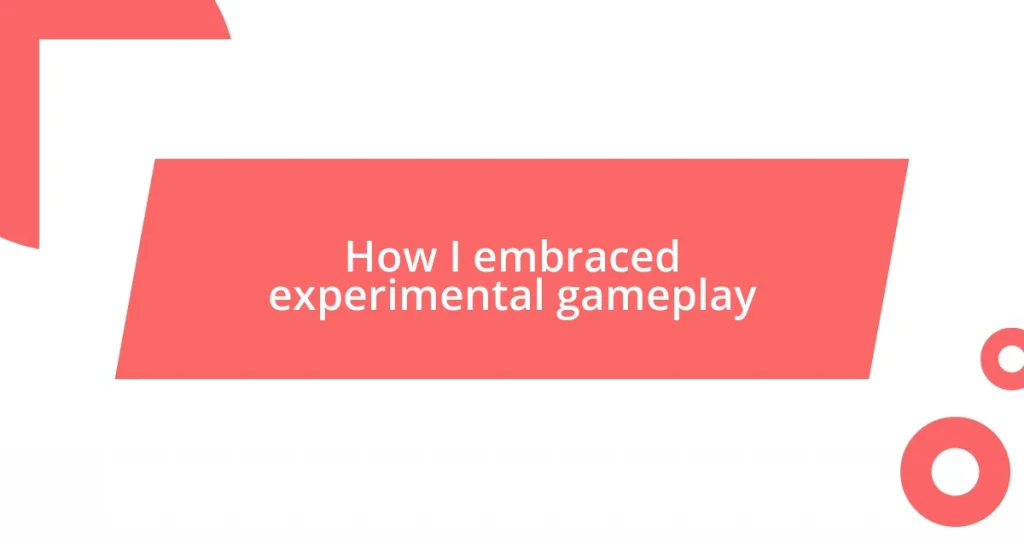Key takeaways:
- Experimental gameplay encourages risk-taking and innovation, leading to unique player experiences and emotional connections.
- Engaging with communities and reflecting on personal gameplay can enhance understanding and appreciation of experimental titles.
- Embracing failure and being open to feedback fosters growth in game development, revealing the importance of flexibility and collaboration.

Understanding experimental gameplay
Experimental gameplay is all about pushing boundaries and exploring the unconventional. I remember the first time I stumbled upon a game that broke all the typical rules; it felt like discovering a hidden gem. The thrill of not knowing what to expect kept me glued to the screen, and I couldn’t help but wonder: how do these developers come up with such innovative ideas?
Engaging with experimental gameplay can evoke a plethora of emotions, from excitement to frustration. I recall playing a title that challenged my problem-solving skills in ways I hadn’t imagined possible. When I finally overcame a seemingly insurmountable obstacle, the sense of achievement was euphoric. This experience made me realize that sometimes, stepping outside our comfort zones can lead to invaluable rewards.
What truly fascinates me about experimental gameplay is its ability to connect players on a deeper level. Have you ever found yourself discussing a game that was so out-of-the-box that it sparked a lively debate among friends? I did, and it made me appreciate how these unique experiences foster creativity and inspire meaningful conversations. In the end, it’s not just about playing a game; it’s about experiencing something that resonates on a personal level.
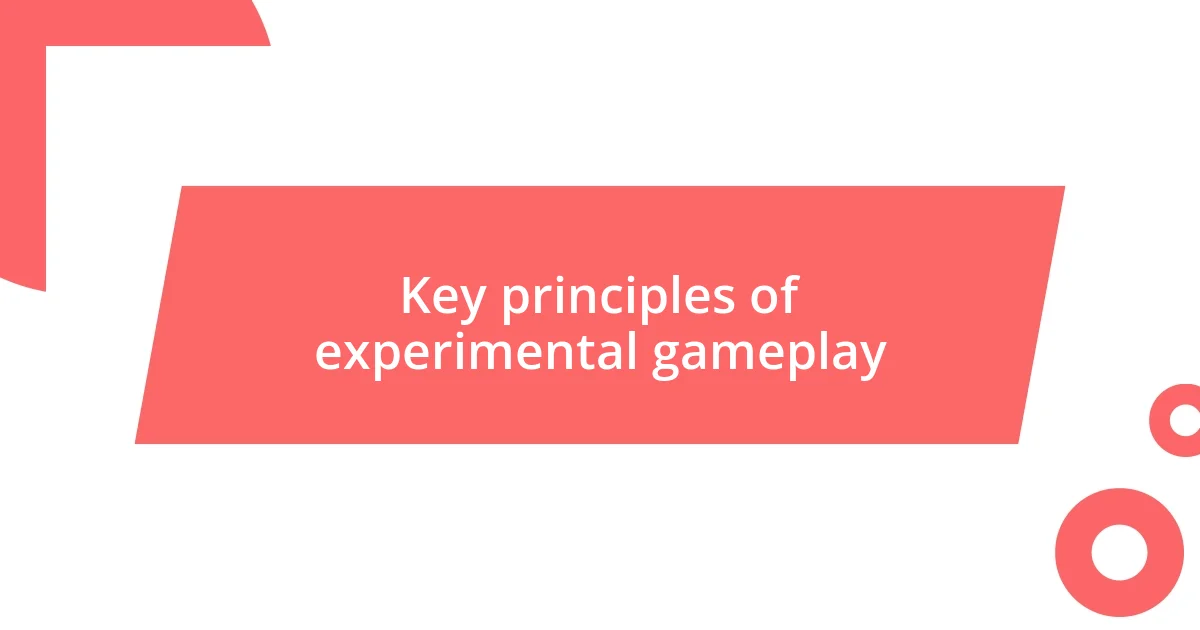
Key principles of experimental gameplay
One key principle of experimental gameplay is the willingness to take risks. I remember diving into a quirky indie game that had no clear objectives. At first, I felt lost, but the freedom to explore on my own terms quickly transformed my confusion into excitement. Embracing unpredictability can lead to unexpected discoveries, which is often where the magic happens in gaming.
- Innovation: Developers experiment with new mechanics and narratives.
- Player Agency: Players are often given choices that significantly impact their experiences.
- Feedback Loops: Games in this category encourage player feedback to shape the ongoing development or future iterations.
Another principle I find crucial is the emphasis on player experience. In one experimental title, I was immersed in an emotional narrative that forced me to confront my own choices and their consequences. It was more than just playing a game; it became a reflection of my values and beliefs, making the experience profoundly moving. This highlights how experimental gameplay can transcend traditional entertainment, creating moments of self-discovery.
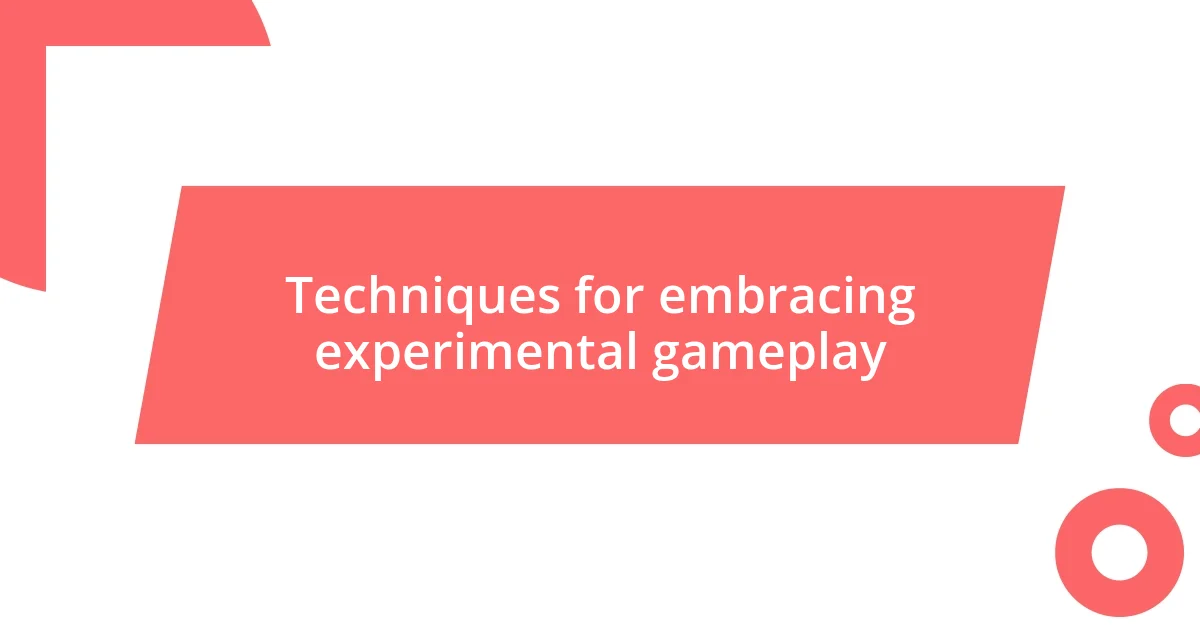
Techniques for embracing experimental gameplay
Embracing experimental gameplay requires a few techniques that can truly enhance the experience. One approach that has worked wonders for me is altering gameplay mechanics. For instance, I remember experimenting with a game that allowed for physics manipulation. I spent hours crafting my own levels with physics rules turned upside down. It was exhilarating to see how a simple tweak could create entirely new challenges and experiences.
Another effective technique is to engage in community discussions. I once joined an online forum dedicated to an experimental game, where players shared their unique experiences. Through this interaction, I discovered new strategies, storylines I missed, and even some hidden easter eggs. The insights gained from others opened my eyes to different aspects of the game that I hadn’t considered, enriching my overall experience.
Finally, I find that keeping a gaming journal can be a game-changer. Each time I play an experimental title, I jot down my thoughts and feelings during the session. I recall vividly after trying an avant-garde narrative game that challenged my perception of choice. Writing about my emotional reactions helped me process the experience deeply, allowing me to appreciate the game’s intricacies more fully.
| Technique | Description |
|---|---|
| Altering Gameplay Mechanics | Change in mechanics can lead to fresh experiences and excitement. |
| Community Engagement | Discussing experiences with others broadens your understanding and enjoyment. |
| Gaming Journal | Documenting thoughts allows for deeper reflection on gameplay experiences. |
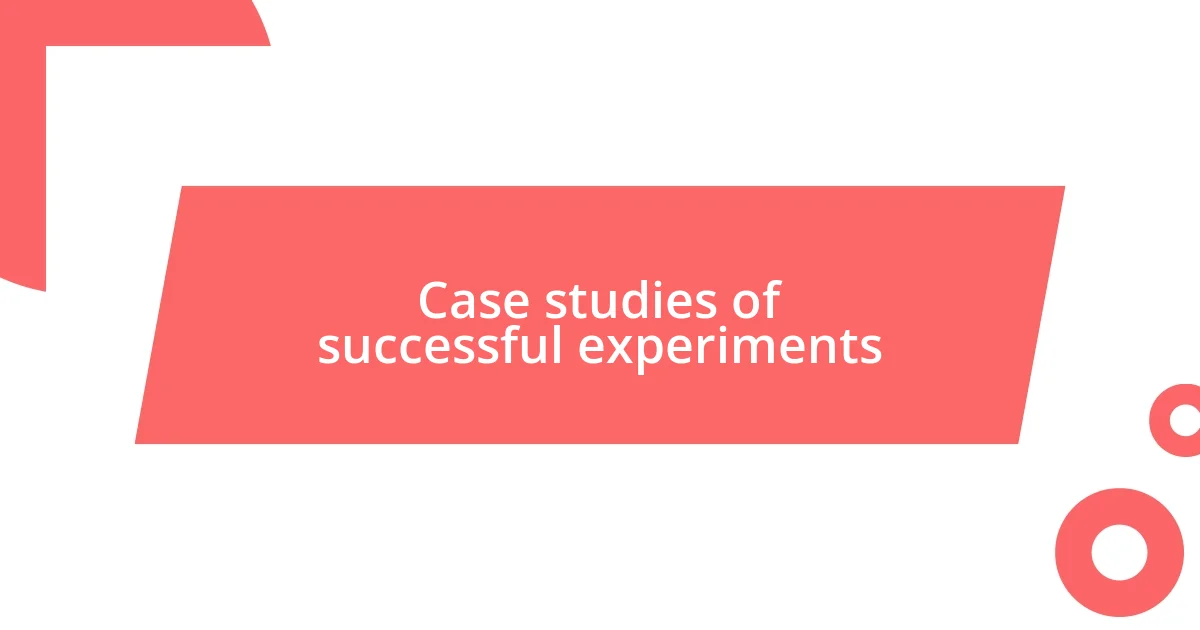
Case studies of successful experiments
Certainly! Here are the paragraphs for the section “Case studies of successful experiments”:
When I played “Journey,” I was captivated by its minimalist design and the way it encouraged meaningful player interactions. There were no words; instead, the game relied on visual storytelling and emotional resonance. I still remember the thrill of meeting another player on my path—they became a silent companion, and we shared an unspoken bond as we navigated this beautiful, desolate world together. It raised a question for me: how can a game communicate profound emotions without dialogue?
Another fascinating experiment is found in “Untitled Goose Game.” The absurd premise of playing as a mischievous goose resonated with players’ sense of humor and creativity. I distinctly recall a moment when I stealthily stole a gardener’s hat—it was hilarious yet oddly satisfying. This playful approach reminded me of the joy that can arise from silly, unpredictable gameplay, inviting players to embrace their inner whimsy while crafting memorable mischief.
In “Detroit: Become Human,” I encountered a rich tapestry of choices that shaped the narrative. Each decision felt weighty, and I often found myself questioning my own moral compass. After one intense play session, I pondered: how far would I go to protect my loved ones? This game pushed the boundaries of player agency, demonstrating that experimental gameplay can inspire deep reflection and meaningful dialogue about our own values.
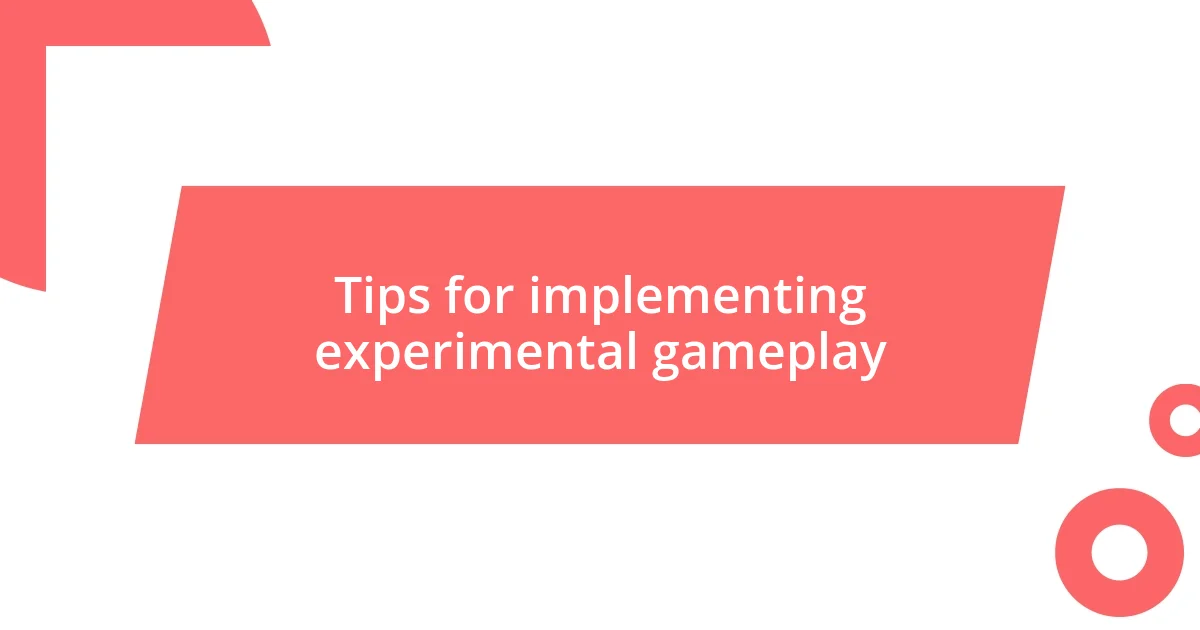
Tips for implementing experimental gameplay
One of my go-to tips for implementing experimental gameplay is diving into prototyping. When I experimented with a game design tool, I created quick prototypes to test mechanics before committing fully. It was fascinating to see how small changes could lead to wildly different gameplay experiences. Have you ever tried rapid iteration? It was a lightbulb moment for me, demonstrating that no idea is set in stone.
Another strategy is to embrace failure as part of the process. I once entered a game jam with a concept that seemed brilliant in theory but fell flat during execution. Instead of feeling defeated, I learned to see that failure as an opportunity to grow. Reflecting on what didn’t work helped me reshape my ideas and ultimately led to a stronger final project. It’s liberating to shift your mindset in this way—failure can actually be your best teacher.
Lastly, don’t shy away from blending genres. I remember fusing platforming mechanics with a puzzle narrative for a side project. The result was surprisingly engaging! Combining elements from different genres can spark creativity and lead to fresh gameplay dynamics. Have you explored genre-bending experiments yourself? It might just open up a treasure trove of new ideas waiting to be discovered!
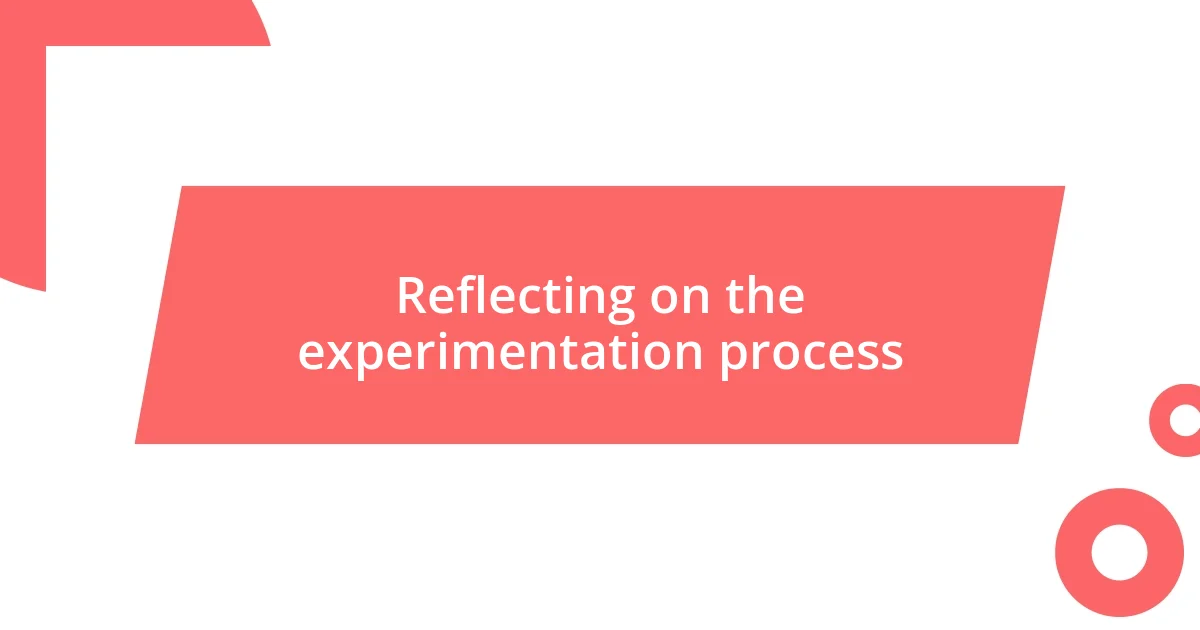
Reflecting on the experimentation process
Reflecting on the experimentation process has been enlightening. I recall one project where I decided to alter a core mechanic halfway through development. I was anxious at first, fearing the change would derail my progress. Yet, as I playedtest the revised version, I felt a rush of excitement. It was as if I had rediscovered the game’s soul, proving that flexibility can lead to surprising breakthroughs.
There was a moment during my experimentation phase when I sat back and simply observed players interacting with my game. Their laughter and unexpected strategies made me rethink everything I had designed. It’s fascinating to realize how much players can teach us about our own creations. I learned that stepping back and seeing things from a fresh perspective is just as important as being in the thick of the development process. Have you ever found value in watching others play your work?
I’ve also had instances where feedback challenged me to take risks I hadn’t considered before. One player suggested an entirely different narrative twist that sparked a new direction for the game. I can’t help but wonder, how often do we stand in our own way? By fully embracing feedback and being open to collaboration, I’ve experienced a growth that echoes in every project I undertake. It’s a continual reminder that the journey of experimentation is not just about the game itself, but about what we learn along the way.










